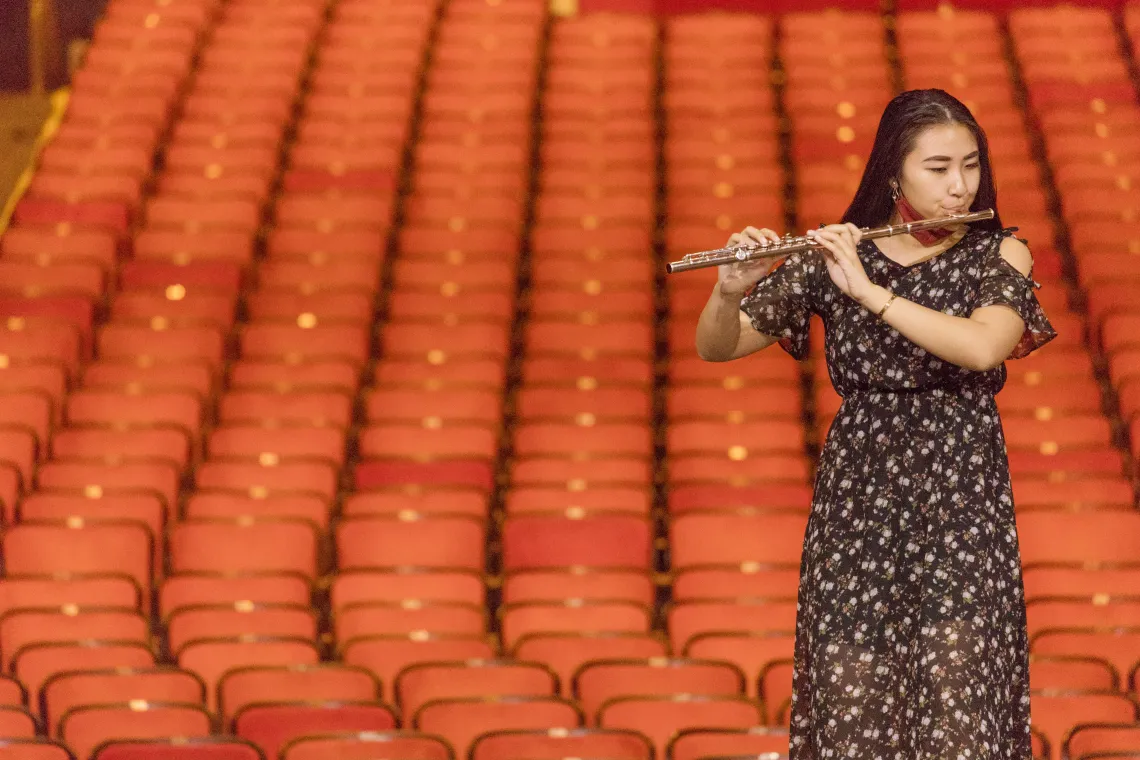The Most Dangerous Instrument

Flutist Kaissy Yau fell in love with playing in an ensemble. Now, she dreams of one day performing professionally in a symphony orchestra.
“Being together in one moment in time and creating music is wonderful,” Yau says. “The sheer volume of sound as a group of 60 — you can’t re-create it as a solo player.”
Yau is a senior at the University of Arizona and is meeting the challenges of the COVID-19 pandemic with resolve.
“I say mask up and stay safe, but don’t let it hinder your creativity,” Yau says. “I want to be as safe as possible, but I’m going to keep making music.”
Born in Hong Kong, Yau has been playing the flute since she was 6 years old. She practices four to six hours a day in preparation for end-of-semester performances and has applied for graduate school, attending Zoom interviews in place of in-person visits.
She and up to 15 fellow flutists practice in person weekly at Centennial Hall, creating a giant circle to play. According to professor of flute Brian Luce, the players are at least 30 feet apart at all times.
Why the extra space? The flute is the only instrument that can’t be played while wearing a mask. A clarinet, for example, can be played through a slit, but the flute can’t — plus, it is open on both ends, allowing aerosols to spread in multiple directions. So safety is paramount.
“The flute is the most dangerous instrument during the pandemic,” Yau says. “I am so safe about it and get tested twice a week. I pretty much have no social life right now.”
Yau says she still has to play music. She practices with a collaborative pianist with whom she has worked exclusively for four years.
“Luckily, we know each other very well, and she trusts me. I always share my tests with her.”
One missing piece for UArizona musicians that simply can’t be replaced is the live audience. Yau’s senior recital won’t have an audience — a vital component, she says, in performance and learning.
“Music-making is a conversation between me and the audience. We play off of each other.
I make eye contact and see their faces. It’s always collaboration,” Yau says.
Instead, Yau and the other UArizona musicians will record their works individually in a studio.
“We want to be creating music together, but with COVID, it’s just not possible,” Yau says. “The School of Music has allowed us to stay safe, recording individually, then [combining the recordings] into a larger composition by an engineer.”
Yau and her professor, Luce, remain optimistic. They both note that, historically, musicians have played on through pandemics. The Conservatoire de Musique de Paris, for example, graduated flute students during the Spanish Flu epidemic.
Orchestras have seats for two flute players, so Yau has been preparing her whole life to compete for one of two spots.
“All musicians are innately competitive,” Yau says. “I really like competition. It allows me to gain small amounts of success in my overall musical journey.”
And a pandemic won’t stop her.
